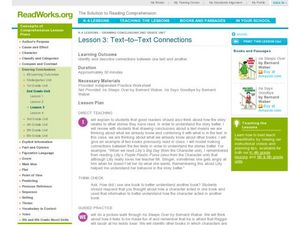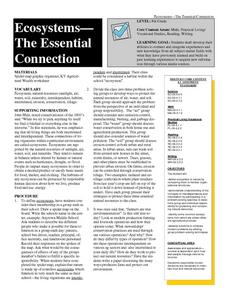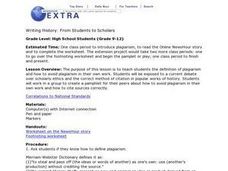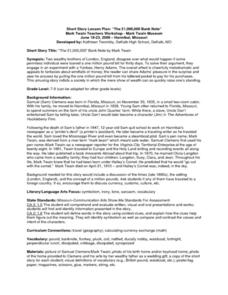Curated OER
Text-to-Text Connections
Help youngsters make connections between two different texts. They read two stories about the same character, Ira Sleeps Over and Ira Says Goodbye. They discuss how the character of Ira acts in each of the stories, how he is the same or...
Curated OER
Persuasive Speech in Julius Caesar
After reading Julius Caesar 1.2 and 1.3, break your class into pairs for this role-play. Each pair will receive one of four prompts (or more, if you create additional examples), in which one person tries to persuade the other to do...
Curated OER
Where Does Food Come From?
Distinguish between food and non-food items. Recognize that food is obtained from both plant and animal sources. Identify sources for some common animal foods then construct a simple food path from the farm to the consumer.
Curated OER
Of Mice and Men: Chapter 3 Reading and Study Guide
Boost comprehension with an excellent reading guide for chapter 3 Of Mice and Men. Learners define four vocabulary words, note one allusion, define five literary terms, and respond to 31 short answer questions regarding the Steinbeck...
Curated OER
Ecosystems-The Essential Connection
Students develop their abilities to solve problems both in school and in a variety of situations similar to that they have encountered in life. They define the term ecosystem in nature by comparing them to familiar organizational...
Meadows Center for Preventing Educational Risk, University of Texas at Austin
Lesson 6 - Vowel-Consonant-E Syllables
Adding an e sometimes significantly changes the pronunciation of a word. An informative lesson introduces Vowel-Consonant-E syllables by helping learners see the difference between the pronunciation of words like mop and mope. A script...
Curated OER
Matthew Henson
Discuss the work of Matthew Henson, an African American who traveled to the North Pole with Robert Peary. After reading the story "Matthew Henson" by Maryann N. Weidt, learners answer questions by drawing inferences and conclusions,...
Curated OER
Greed is Good?
From Mr. Merdle to Mr. Madoff? A viewing of the PBS adaptation of Charles Dickens’ “Little Dorrit” launches an examination of greedy characters in literature and a study of greed, unfairness, and economic hardship today. The richly...
Curated OER
Mapping Your Identity: A Back-To-School Ice Breaker
Identify the unique personal attributes of your class members. Begin by viewing the Visual Thesaurus and discussing displayed attributes associated with famous American leaders. Using these identity maps as models, pupils generate nouns...
Curated OER
Sadako and the Thousand Paper Cranes
Have your class explore the effects of war by reading Eleanor Coerr's story, "Sadako and the Thousand Paper Cranes." This is a story about a sixth grader who lives in Hiroshima when the atomic bomb is dropped. Learners answer questions,...
Curated OER
Modern Minstrelsy: Exploring Racist Stereotypes in Literature and Life
Satires may be designed to expose a bias to ridicule but if misunderstood can they reinforce that bias? Langston Hughes poem, “Minstrel Man” opens a discussion of racist stereotypes, the minstrel tradition, and the musical, “The...
Curated OER
The Hobbit
Here’s a series of exercises designed to be used after readers have finished reading The Hobbit. Pairs identify the speaker of a series of quotes, match characters with qualities, and provide evidence from the story to support their...
Curated OER
Stage a Debate: A Primer for Teachers (Lincoln-Douglas Debate Format)
For a comprehensive overview of debate styles and formats, look at this resource. It details the Lincoln-Douglas debate format (one-to-one debate with specific, timed rounds of points, cross-examination, and rebuttals). You can also find...
Curated OER
Shame on You!
Should public humiliation be an acceptable consequence for a crime? Have your middle schoolers engage in a round table discussion about the recent resurgence of the use of public humiliation as a punishment for crimes in the United...
Curated OER
Following the Leaders
Examine the historic election of Pope Benedict XVI and reflect on the challenges he faces as the new leader of the Catholic Church. This New York Times lesson investigates how other world leaders are chosen in different forms of...
Curated OER
Writing History: From Students to Scholars
An Online NewsHour article about scholarly ethics launches this study of plagiarism. Since historians are supposed to bring original ideas and perspectives to their publications, they must give credit to the ideas of others. After a...
Curated OER
"The 1,000,000 Pound Bank Note" by Mark Twain
Compare real events from Mark Twain's life to events in the story. Middle school readers identify point-of-view, its purpose, and its reliability by citing two examples. They describe the tone of the story using four examples and...
Curated OER
Arti-Factual Evidence
Practice responding to controversial information with the New York Times lesson provided here. Middle schoolers watch a video interview with the director of The Lost Tomb of Jesus. After reading a companion article, they identify the...
Curated OER
Say Hi to Haibun Fun
What is a haibun? With this interesting lesson, writers will experience the Japanese writing form haibun, identify elements important to Japanese writing styles, analyze a haibun, and compose their own. Different from the typical journal...
Curated OER
The Two Sides of the Declaration of Independence
Budding historians read six documents related to grievances that led to the writing of the Declaration of Independence. They then craft an essay in which they discuss the perspective of both the colonists and the king. This DBQ could be...
Curated OER
Investigating the Harlem Renaissance
The work of Langston Hughes opens the door to research into the origin and legacy of the Harlem Renaissance and how the literature of the period can be viewed as a commentary on race relations in America. In addition, groups are assigned...
Curated OER
Writing Summaries
Practice summary writing with informational texts. Young readers create summaries after reading magazine articles, newspaper articles, or other forms of informational texts. Readers use the GRASP strategy (read text, write what you...
Curated OER
Frederick Douglass, Narrative of the Life of Frederick Douglass an American Slave, Written by Himself
Foster reader confidence when encountering complex text and reinforce the skills readers have acquired to build and extend their understanding of text. The plan uses a section of Douglass’ narrative as an exemplar text. Directions for...
Curated OER
Artistic Interpretation of a Classic: The Author's Role
Reading the original Hans Christian Andersen tale of “The Little Mermaid” and viewing the Great Performances: The Little Mermaid from the San Francisco Ballet video offers class members an opportunity to consider how artistic decisions...

























